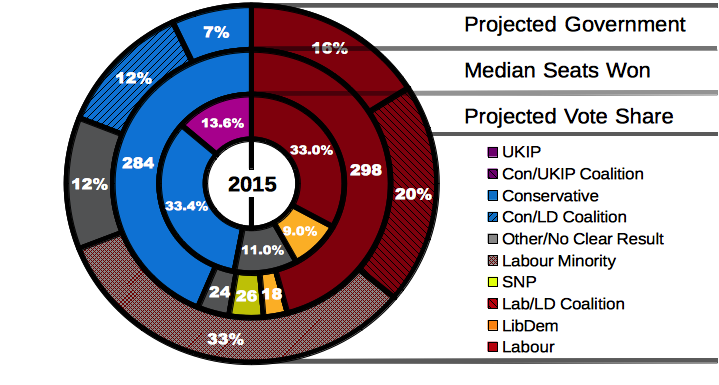Polling is still becalmed in the sea of the statistical draw. While
moving very slowly around an average of a sub-percentage-point lead for
Labour, the figure is essentially a tie in the low 30s between Labour
and Conservative. There's so little momentum, that I can show you two
near identical charts of the prediction for April, and a weighted
average result for today.
 |  |
Momentum is basically flat across polling right now, with no apparent sustained movement changing people's minds. Revert to mean has been occurring very slowly, and has likely provided most of the Conservative gains in polling since last year, but that effect is now trailing off sharply as polling seems to be cementing in. In Scotland it looks like the SNP's figure is sticking around a figure that is substantially lower than the higher end of polling it had received following the referendum, but still high enough to make large gains against Labour and the Liberal Democrats. The Greens look set to maintain their seat, but just miss translating their improved vote into any more seats.
UKIP continue to be the wildcard of this election, without a clear differential that concentrates their votes in particular seats the model doesn't think they can win any, even their current by-election wins. There's precedent for that in the SDP's history during the 80s. But many analysts think that UKIP could well concentrate their vote in a handful of targets to provide them with some MPs. The problem is that the only evidence comes from European elections, Local Elections and By-Elections, all of which are very different from General Elections. The European elections had a much lower turn-out, and have traditionally had much higher vote shares for the 'protest vote' minor parties than in General Elections. This makes it hard to say how many, if any, UKIP MPs will be returned at the next election.
But it wouldn't really make that much different to the Electoral maths, as the chances of a UKIP and Conservative coalition are mathematically problematic, and the chances of a UKIP plus Liberal Democrat plus Conservative coalition are politically problematic.
Source http://ukelectiontrend.blogspot.co.uk/
1

No comments:
Post a Comment
Comment is open to all feel free to link to this blog.